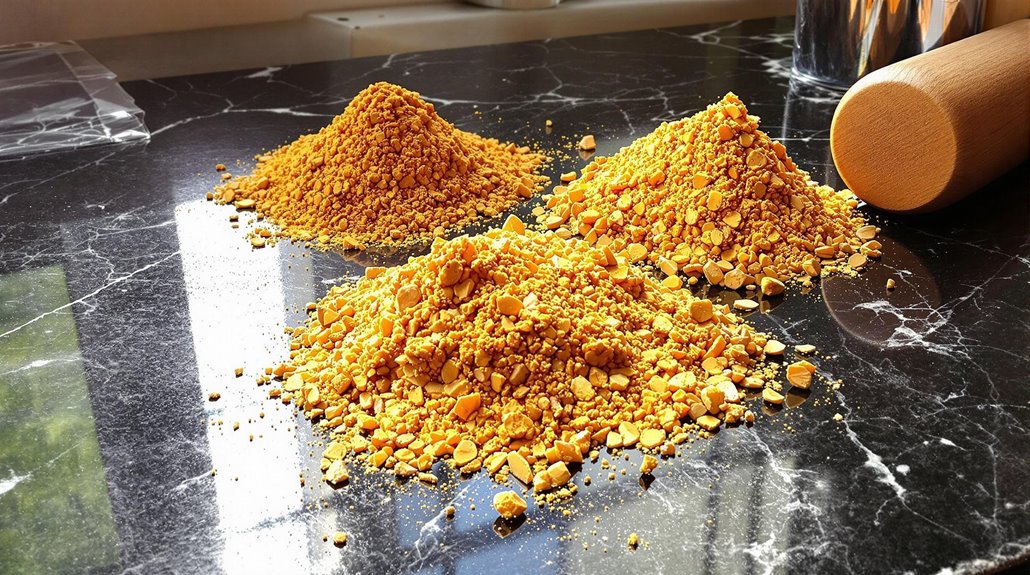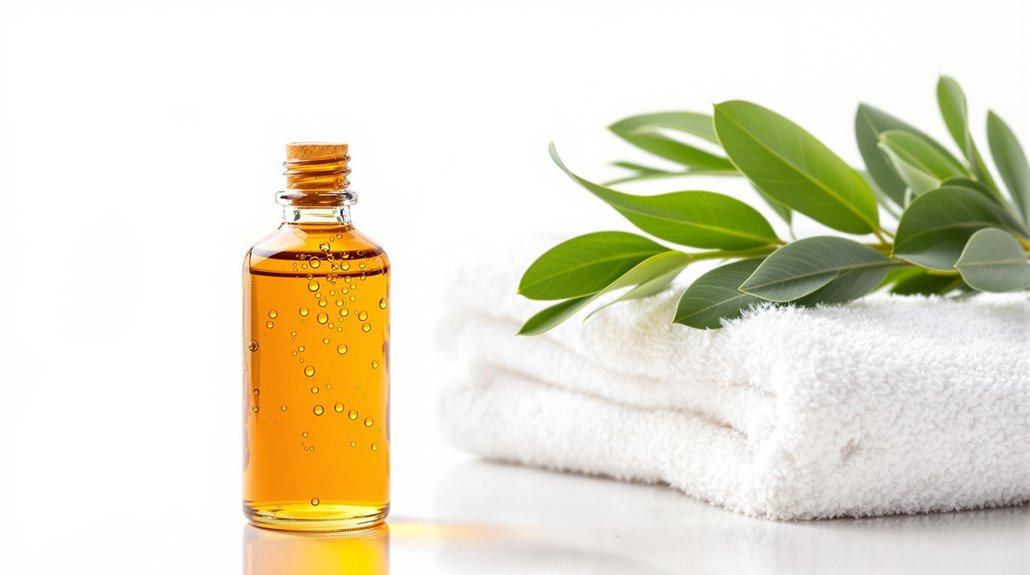Sandalwood for Eczema: Everything You Need to Know
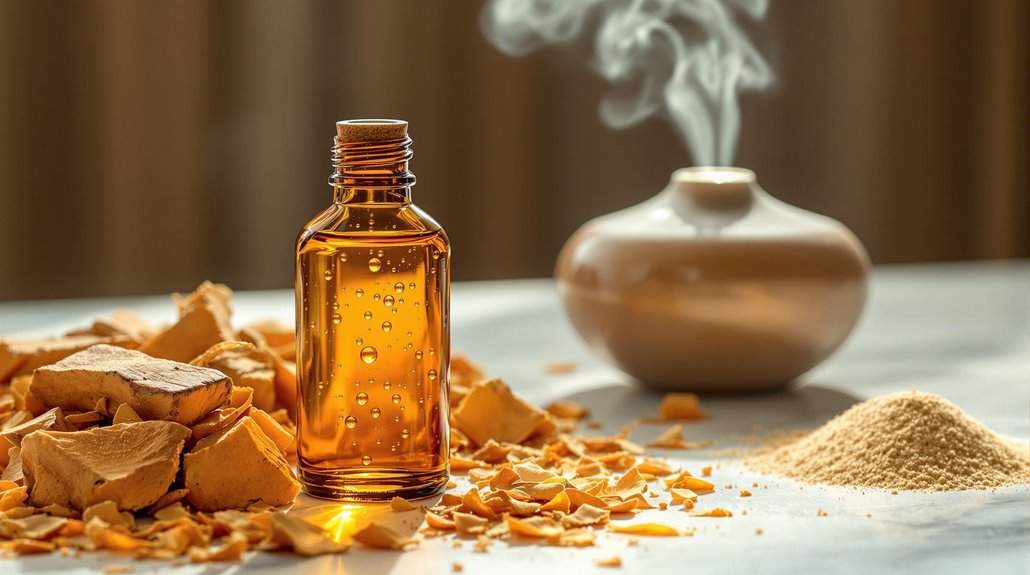
Sandalwood offers powerful natural relief for eczema through its anti-inflammatory and antimicrobial properties. You'll find different types available, but East Indian Sandalwood (Santalum album) is most effective, with studies showing an 87.5% improvement in symptoms when used as a 0.1% concentration oil. To use it safely, dilute 2-3 drops of sandalwood essential oil in a tablespoon of carrier oil like coconut or jojoba, and apply twice daily to affected areas after performing a patch test. You can also create soothing DIY remedies using sandalwood powder mixed with rose water. The deeper you investigate this ancient remedy's potential, the more healing benefits you'll uncover.
Understanding Sandalwood Types
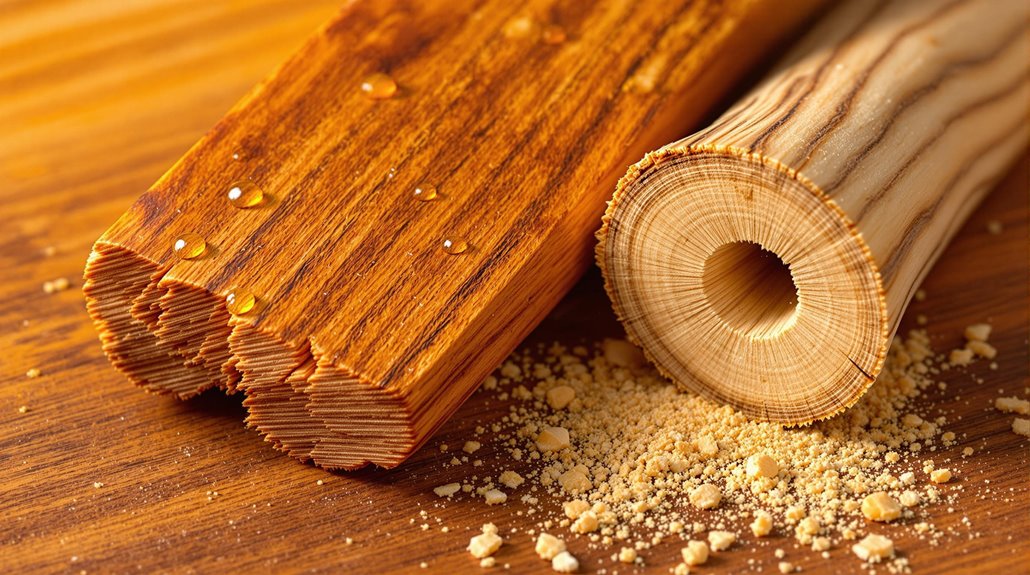
Anyone exploring sandalwood for eczema treatment should first understand the different varieties available. The most widely used variety is Santalum album, also known as white or East Indian Sandalwood oil. This essential oil has been traditionally used in skincare and is often referred to as Sandalwood album oil.
You'll find that Australian sandalwood (Santalam spicatum) offers another option, and it's become increasingly popular in skincare products. While it shares some properties with its Indian cousin, it's distinct in both composition and cultural significance. If you're researching Hawaiian sandalwood varieties, you should know they're endangered species, which makes them rare and typically unavailable for commercial use.
Fiji sandalwood (Santalum yasi) is another variety you might encounter in cosmetic products. It's valued for its aromatic properties and traditional uses. It's crucial to recognize that some products labeled as "sandal wood" might actually contain red sandalwood (Pterocarpus santalinus), which isn't true sandalwood at all. While it's used in cosmetics, it's botanically unrelated to the Santalum family and offers different properties.
Benefits for Skin Health
Now that you're familiar with different sandalwood varieties, let's investigate their outstanding benefits for skin health. When it comes to treating inflammatory skin conditions, sandalwood oil stands out for its exceptional therapeutic properties. Its essential compounds work together to provide potent anti-inflammatory, antimicrobial, and antioxidant properties that can help manage conditions like eczema.
You'll find that sandalwood's antiseptic properties make it particularly effective at preventing skin infections while promoting natural wound healing. If you're dealing with irritated or inflamed skin, you'll appreciate how this essential oil can help reduce redness and discomfort. The oil's potential benefits extend beyond just treating symptoms - it actually helps improve your skin's overall texture and elasticity.
What makes sandalwood especially impactful is its multi-targeting approach to skin health. While it fights inflammation and bacteria, it simultaneously soothes your senses with its calming aroma. This combination of physical and aromatic benefits creates a comprehensive treatment approach. When you're looking for a natural solution to skin concerns, sandalwood's antioxidant properties help protect your skin while supporting its natural healing processes.
How Sandalwood Treats Eczema

Many eczema sufferers find relief through sandalwood's powerful combination of antimicrobial and anti-inflammatory properties. When you're dealing with this challenging skin condition, you'll find that sandalwood oil works as one of the most effective natural remedies by providing immediate soothing relief while promoting skin healing.
You can use sandalwood in two primary forms to treat your eczema: as an oil or as a paste. The oil, which should be applied sparingly due to its potency, delivers concentrated healing benefits directly to affected areas. Alternatively, you can create a paste by mixing sandalwood powder with water, which offers similar therapeutic effects. Both forms help moisturize dry skin and reduce the urge to scratch, which is essential for managing eczema symptoms.
What makes sandalwood particularly effective for traditional uses in treating eczema is its unique combination of emollient and anti-inflammatory properties. By incorporating either the oil or paste into your skincare routine, you're not just treating symptoms - you're supporting your skin's natural healing process. This makes sandalwood a pivotal addition to any eczema management plan, providing both immediate comfort and long-term benefits.
Scientific Research and Evidence
Scientific evidence supporting sandalwood's effectiveness for eczema continues to emerge, with promising results from recent clinical trials. A notable 2017 study demonstrated that topical application of East Indian Sandalwood Oil (EISO) at 0.1% concentration helped 87.5% of participants achieve a 25% reduction in eczema severity over eight weeks. This essential oil's anti-inflammatory properties make it a promising complementary medicine option.
While sandalwood shows potential as an alternative treatment for eczema, it is crucial to observe that research in this area remains limited. When compared to other natural remedies, such as Manuka honey and L-histidine supplements, sandalwood's scientific backing is still developing. For instance, vitamin E studies have shown short-term benefits, but effects don't last after treatment ends.
Current scientific research on skin benefits from sandalwood is encouraging, but more extensive clinical trials are needed. The small sample sizes and study design limitations of existing research make it challenging to draw definitive outcomes about its effectiveness. However, the positive results from available studies suggest that sandalwood deserves further investigation as a treatment option for eczema symptoms.
Application Methods and Usage
Proper application of sandalwood for eczema treatment requires careful attention to dilution ratios and frequency of use. When applying sandalwood, you'll need to mix it with a carrier oil like coconut, jojoba, or almond oil. The recommended ratio is 2-3 drops of sandalwood essential oil per tablespoon of carrier oil.
Before treating skin conditions, always perform a patch test before applying the mixture to larger areas. Apply a small amount to your inner forearm and wait 24 hours to confirm no allergic reactions occur. If no side effects were found, you can proceed with the treatment.
For mild to moderate eczema symptoms, apply the diluted mixture to affected areas twice daily. Gently massage it into clean, slightly damp skin to help moisturize dry, irritated patches. You can incorporate this into your regular skin care routine, but don't use it alongside other essential oils initially, as this may increase sensitivity.
Remember to store your sandalwood mixture in a dark glass bottle, away from direct sunlight and heat. If irritation develops, discontinue use immediately and consult your healthcare provider.
DIY Sandalwood Remedies
Creating effective DIY sandalwood remedies allows you to employ this powerful ingredient's healing properties for eczema relief at home. When crafting your homemade treatments, it is critical to think about sustainable harvesting and ethical sourcing of sandalwood to guarantee both quality and environmental responsibility.
Drawing from traditional Ayurvedic medicine practices, you can create various remedies for your skin condition:
- Mix sandalwood powder with rose water to form a soothing paste for direct topical application on affected areas
- Combine sandalwood oil with your favorite natural carrier oils to create a nourishing homemade serum
- Prepare a therapeutic face mask by blending sandalwood powder with turmeric and other skin-calming ingredients
- Add sandalwood oil to bath preparations for full-body relief and relaxation
When making these remedies, you'll want to start with small batches to test your skin's response. Store your homemade treatments in clean, airtight containers away from direct sunlight to maintain their potency. Remember to perform a patch test before applying any new remedy to confirm you don't experience adverse reactions to the ingredients.
Safety Considerations and Precautions
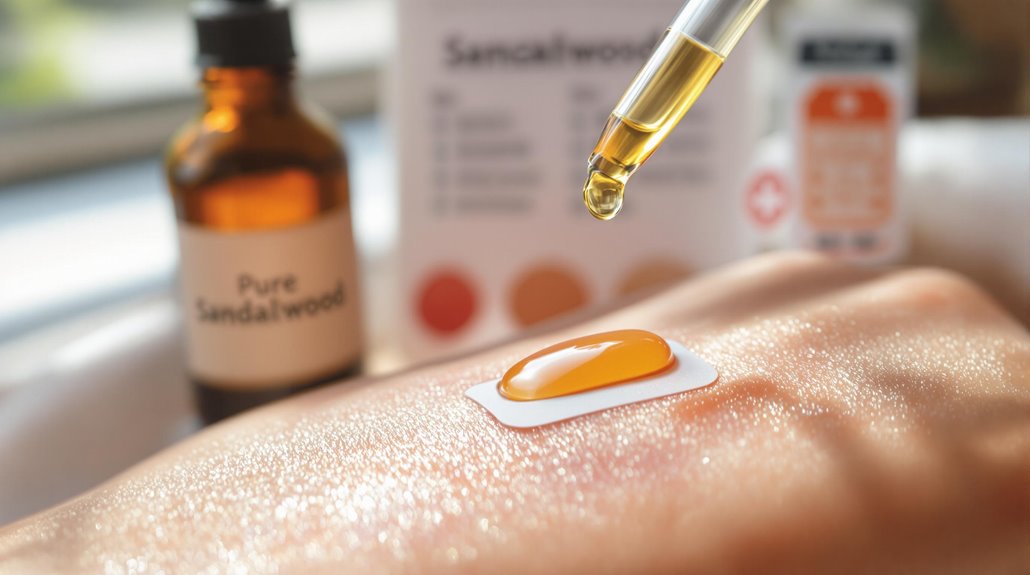
Safe use of sandalwood products demands careful attention to potential risks and sensitivities. While this essential oil offers numerous benefits, you'll need to be aware of potential adverse reactions, particularly if you have sensitive skin or underlying health conditions.
Always dilute sandalwood oil with a carrier oil before applying it to your skin. Using the undiluted oil can trigger skin sensitivities or an allergic reaction, leading to symptoms like itching, nausea, or stomach discomfort. Even with proper dilution, it's wise to perform a patch test before full application to guarantee you don't have an adverse response.
If you're pregnant, nursing, or taking medication, don't use sandalwood oil without first consulting your healthcare provider. This precaution is especially important if you have a history of heart attack or atherosclerosis. Those with severe allergies should also seek medical guidance before incorporating sandalwood into their skincare routine.
While research supports sandalwood's anti-inflammatory and skin-enhancing properties, safety should always be your priority. By following proper dilution guidelines and heeding these precautions, you can minimize risks while potentially benefiting from sandalwood's therapeutic properties.
Sustainable Sourcing and Ethics
Beyond individual safety concerns, the ethical implications of sandalwood use deserve serious consideration. When choosing sandalwood products for eczema treatment, you'll need to weigh both environmental and social impacts. Sustainable sourcing has become essential as several sandalwood species face endangerment due to overharvesting, threatening vulnerable populations of these precious trees.
The ethical considerations extend beyond environmental concerns:
- Historical use of sandalwood in Ayurvedic traditions for skin whitening has problematic connections to colorism and oppression, requiring conscious awareness when selecting products
- Sustainable sourcing practices must be verified through reputable certification systems to prevent contributing to species decline
- Ethical sourcing involves fair labor practices and supporting indigenous communities who've traditionally harvested sandalwood
- Product selection should balance effectiveness with responsibility, considering dosage considerations, pregnancy contraindications, and potential medication interactions
When purchasing sandalwood products for eczema, look for suppliers who demonstrate commitment to both environmental stewardship and ethical practices. This guarantees your skincare choices don't contribute to ecological damage while maintaining awareness of cultural sensitivities and safety concerns, including risks of skin irritation from improperly sourced products.
Alternative Therapeutic Applications
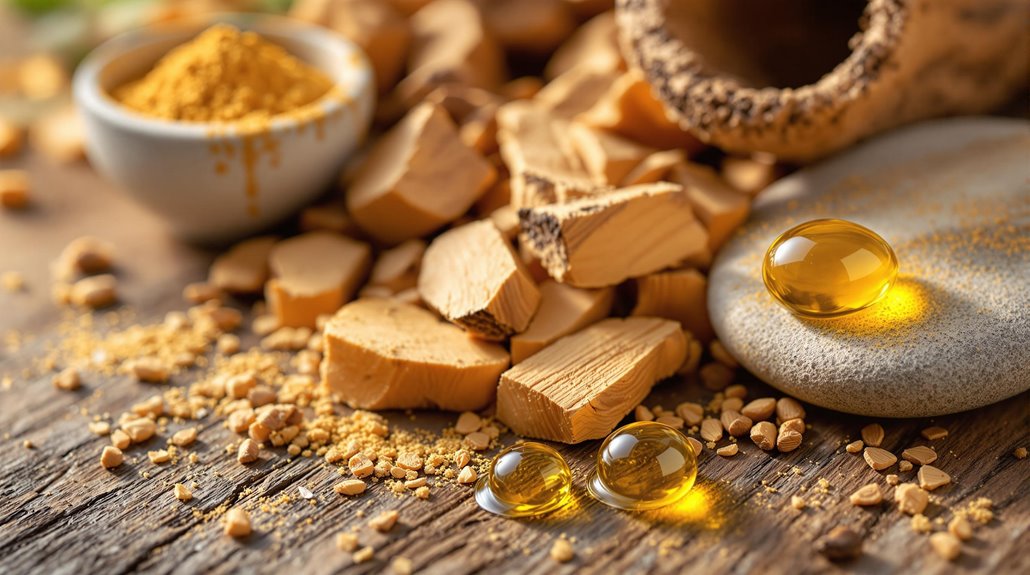
Through extensive research and traditional practices, sandalwood's therapeutic potential extends far beyond treating eczema. While its anti-inflammatory properties make it effective for managing eczema symptoms, you'll find that sandalwood essential oil offers numerous other benefits for your skin health and overall well-being.
When you're dealing with skin infections or wounds, sandalwood's antimicrobial properties can help prevent bacterial growth and promote faster wound healing. You'll also notice improvements in your skin's elasticity and texture when incorporating sandalwood into your skincare formulations. This versatility has made it a valued ingredient in traditional medicine systems, particularly Ayurveda, where it's been used to address various skin conditions for centuries.
Today's researchers continue to uncover new applications for this exceptional ingredient. Beyond its traditional uses, you can benefit from sandalwood's therapeutic potential in modern skincare products designed to enhance skin appearance and promote healing. Whether you're seeking relief from inflammatory skin conditions or looking to improve your skin's overall health, sandalwood essential oil offers a natural, time-tested solution that bridges ancient wisdom with contemporary scientific understanding.

